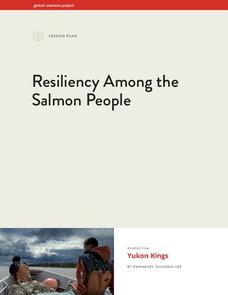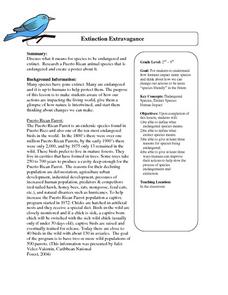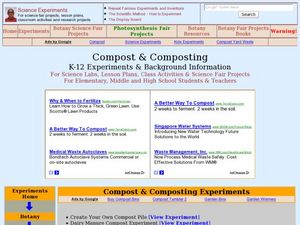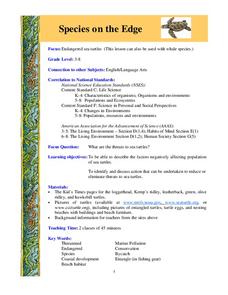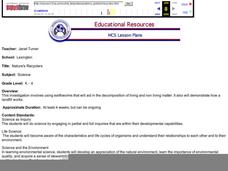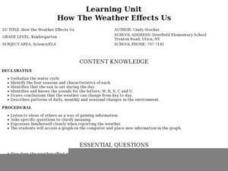Florida International University
Are You Concentrating?
Explore the importance of a concentration gradient in the rates of dissolution. Using the ocean ecosystem, learners study rates of dissolution around coral reefs. A hands-on experiment helps individuals discover the effects of changing a...
Curated OER
Biology Jeopardy
Play Jeopardy as you review what might possibly be an entire year's high school biology course! The vast variety of questions requires that you read through the slides to make sure that they all relate to your curriculum. You could make...
Virginia Department of Education
Evidence of Evolution
What an impression fossils make! In this activity, aspiring paleontologists view fossils and construct a timeline to further understand how the lack of natural adaptation caused historical organisms to become extinct. While they should...
Global Oneness Project
Resiliency Among the Salmon People
Is losing cultural traditions the cost of social progress, or should people make stronger efforts to preserve these traditions? High schoolers watch a short film about the native Yup'ik people in Alaska and how they handle the shifts in...
Curated OER
Exploring Habitats
Students analyze the difference between the human habitat and the different habitats of animals in the six lessons of this unit. The students' imaginations and literature are used to explore important aspects of the living environments...
Curated OER
It's Alive! Or is it?
Students differentiate the characteristics of living and nonliving things. In this life science lesson, students compare and contrast robots and living things. Given an object, they decide whether it's is living or not and defend their...
Curated OER
Polluting the Environment
Fourth graders construct mini-ecosystem, pollute the ecosystem, observe, collect, and record data on the effects of these pollutants on their ecosystem, organize data on spreadsheets, create graphs, and design presentations to share with...
Curated OER
Eco Points Score Card
Students play a game in which points are assigned to daily activities which require fossil fuels or electricity. They compare the impact their energy and transportation choices have in everyday life.
Curated OER
Greenhouse Gases: The Chemistry Behind the Culprits
Ninth graders investigate the effect of different gases in the atmosphere. In this chemistry lesson plan, 9th graders explain how these gases contribute to global warming. They suggest possible solutions to this growing problem.
Curated OER
Sustainable Island Development
Students explain how the basic human needs of a large group of people can be met. They describe and evaluate alternative methods for providing water and food, producing electricity, handling wastes, and transporting goods and people....
Curated OER
Protecting Our Planet
Students examine the impact of pollution. In this pollution lesson, students watch Protecting Our Planet, then participate in a simulation of the effect of pollution on a variety of organisms.
Curated OER
Measuring the Volume of Water Discharge for a Stream or Canal
Students study how to measure and calculate the volume of water flowing down a stream or canal and use simple tools to make measurements. Next, students determine how many people cold live off the volume of water measured. Finally, they...
Curated OER
Extinction Extravagance
Students brainstorm and discuss what it means for a species to be considered endangered and/or extinct. They research animals in Puerto Rico and choose one that is considered endangered and create a poster about it. In addition, they...
Curated OER
Deep Gardens
Students compare and contrast deep-sea coral reefs with shallow-water coral reefs. In this underwater ecology lesson, students describe three types of coral and explain why scientists are concerned about the future of deep-sea coral.
Curated OER
Compost and Composting Experiments
Students investigate the composting process through a variety of experiments. In this ecology lesson, students discuss the benefits of composting. They examine how compost affect plant growth.
Curated OER
Species on the Edge
Young scholars study science. In this endangered species lesson, students examine sea turtles and actions that can be taken to help keep them alive. They work in small groups to research different species of turtles and share their...
Curated OER
Learning From Leaves: A Look at Leaf Size
Students measure and analyze leaves from various environments. They discuss the environments, and make inferences about environmental variables that could have contributed to the differences in leaf size and texture.
Curated OER
Nature's Recyclers
Learners create environments to demonstrate how earthworms interact with their surroundings.
Curated OER
Create a Non-native/Invasion Species
Students view a video about non-native/invasion species. They create a non-native/invasion species that they think would have an impact on farming, industry, recreation, or water in the local environment.
Curated OER
What Parts Are There to a Plant?
Learners explore botany by completing plant science worksheets. In this plant anatomy lesson, students examine real vegetables in class using magnifying glasses. Learners identify the plants anatomy and complete worksheets discussing...
Curated OER
Spineless - YES... Helpless - NO!
Students distinguish between invertebrate and vertebrate organisms while examining the zoological classes of a number of invertebrates. They illustrate a food web of these organisms and investigate the impact of humans on the oceanic...
Curated OER
How The Weather Effects Us
Students discover how weather affects their lives. They review the climates of Florida, Alaska and New York. They need choose the place they would most like to live in based on the climate of that state.
Curated OER
Cell Organelles
Learners explore biology by researching living cells. In this living organism lesson, students participate in a role-playing activity in which all the learners in class form one plant cell by portraying specific parts of a cell. Students...
Curated OER
Waddle You Know About Penguins
Second graders study the similarities and differences of the seventeen species of penguins. They investigate habitats and how these habitats are suited to each species characteristics. They see how animals adapt to their environments.





